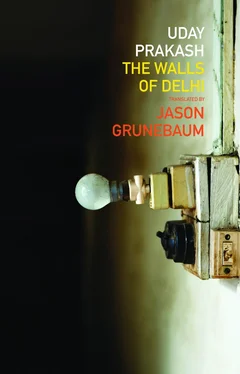It was the time when power was defining gender.
It was the time when a girl from the north-east of India was kidnapped into a car near Dhaula Kuan in Delhi and raped for two-and-a-half hours nonstop by five men while travelling on every VIP road in Delhi. And it was when in Imphal, after the rape and murder of Manorama, hundreds of Krishna-devotee women stripped naked in front of the army headquarters to protest.
It was the time when two women failed in their struggle against the Sardar Sarovar dam, and so four thousand dalit and adivasi homes and fields and yards were submerged, and in the flood, forest animals and plants and trees and so much more was swept away.
The sad faces of those tired women were shown on TV, nonstop, in tears, defeated.
It was the time when I left Delhi and moved to Vaishali and from my rooftop could see that very same Jhandapur in Ghaziabad where exactly fifteen years earlier the revolutionary artist and performer named Safdar Hashmi was murdered.)
In the court of Gajanan Madhav Muktibodh, judge (first class), all the witnesses and evidence — and even the two investigative reports of the two district magistrates’ inquiries — corroborated that Bisnath was indeed Mohandas. So, then: this pauper who’s in a bad way and who swears and swears he’s Mohandas — who is he? This court didn’t have any direct judicial authority over this question. It possibly could be another case altogether, if some lawyer submitted a petition on behalf of the plaintiff.
Harshvarddhan Soni couldn’t sleep for three days and three nights. He positively knew that Mohandas was Mohandas — but it wasn’t just that this was difficult to prove, it was becoming impossible. He sent me an email:
‘This is too much. I can’t eat, I can’t sleep. Neither can Mohandas. Everybody knows he’s the real Mohandas, but it’s impossible to prove. I’m at my wits’ end. I don’t know what to do. The two of us are receiving threats: shut up or else. In the meantime I found out that Bisnath has taken on Ras Bihari Rai as his attorney. You know him as well as I do — big shot in the ruling party. His wife’s a member of the city council and is the head of a few government organisations and NGOs. There are half-a-dozen people ready to testify on behalf of Mohandas: Biran Baiga, Gopaldas, Biharidas, Ramoli, Sitiya… but their appearance will make it seem like they’re witnesses we just bought off… each one of them looks like a homeless person.
‘What I’m thinking is that I’ll go straight to the judge and have a word with him. He smokes bidis and looks a little, well — off. His name is G.M. Muktibodh. He’s Marathi, but he speaks Hindi like you wouldn’t believe. After court lets out he sits outside drinking chai at Ramdeen’s little tea shack on the side of the road.
‘And I’ve noticed that in court when he looks at Mohandas, there’s something in his eyes that stirs a little bit and makes him nervous. The veins on his forehead get bulgy and they look like they’re going to pop out of his head. I’m actually a little scared that they might one day burst. There’s something in his eyes that reminds me of a spy or secret agent who can very quietly see deeply into anyone’s soul, like he can probe and pierce anything. The word is that his house is filled with books and he reads and reads every night until three in the morning.
‘I’ve also heard something else that’s a little disturbing, that even though G.N. Muktibodh is a judge of the first class, the government’s got the CID watching his every move…’
With no other option he could think of, Harshvarddhan Soni took what amounted to a gamble. Any time a lawyer decided to meet a judge about an ongoing case, and on top of this with a judge with an air of mystery — it’s a decision fraught with danger. If G.M. Muktibodh got angry, Harshvarddhan could jeopardise his entire career. His past had been full of every possible struggle, strain, and sorrow; the memory of the suicide of his despondent brother who couldn’t find work never left his mind for a moment. ‘The practice of law’ was just a bunch of words. Most of the people who came to him didn’t have enough money for a fancy lawyer. He wasn’t going to see a cent from Mohandas’s trial, and had even put in five thousand of his own money on the case. And yet — he decided to take the risk and go and meet the judge.
Harshvarddhan felt a little hopeful when he arrived at the door of Gajanan Madhav Muktibodh’s flat and saw on his face an expression as if he’d already known he was coming, that he knew absolutely positively that Harshvarddhan was planning on paying him a visit. He pulled up a rickety old wooden stool and said, ‘Have a seat! I’ll go make some tea,’ and disappeared into the kitchen.
Harshvarddhan glanced around the room. Everything was scattered everywhere. Piles of books lay all around, some of them kept open with pencils, cards, or leaves stuck in the spine. Maybe he was fond of those particular pages and had to read them over and over. The condition of the room suggested that he lived alone. Harshvarddhan had found out that the judge had been transferred frequently from one undeveloped area to another, ones with many adivasis, where cases like this were rare: cases where big shots or rich businessmen or people at that level might see any grief. Harshvarddhan saw portraits of Gandhi and Marx on the wall. A small Ganesh statue was kept in the corner. Bookshelves against the left wall were filled with law books that looked as if they hadn’t been opened in years.
G.M. Muktibodh returned with the chai along with a little dish with simple snacks. He set down the tray on a makeshift coffee table, and sat down on his cushion. It was good, strong street chai, boiled like hell.
A silence hung over the room. Harshvarddhan didn’t have the courage to begin the conversation. An ancient clock that probably needed a key to be wound stood against the wall in front of them. It was stopped. Next to it was a calendar with a drawing on its upper flap of Bal Gangadhar Tilak with his pagri turban wrapped around his head; the year on the calendar, Harshvarddhan noted, was 1964.
‘I do realise that,’ (the judge said after an endless sigh that had come from the very depths of his being) ‘Mohandas is the real Mohandas.’ His voice sounded as if it were coming from the bottom of a well; it was a quiet, peeping voice. He took a big sip of chai. The strain on his face loosened up a bit with the gulp and the taste of the hot drink.
‘And that other man’s a fraud. From start to finish, he’s impersonating someone else. I know this, I know that his name is actually Bisnath, son of Nagendranath, and that he’s stolen the identity of Mohandas and has been illegally living at A/11 Lenin Nagar working as deputy depot supervisor. He’s a fraud, a crook, a sleaze!’ he said, sometimes switching to English. Though he didn’t speak loudly, there was a kind of sharp, steely resolve in his voice. He took a packet of bidis out of his pocket, picked one out, first blew on the fat end, lit it with a match and took a long, hard drag.
Harshvarddhan felt as if he’d been transported to another time and place.
‘This is what I came here to tell you,’ he said. ‘But how do you know who is the real Mohandas?’
‘It’s not hard to figure out. If you’re at all perceptive and have a little wits about you,’ Muktibodh said, then began to look worried and got lost in thought. He took another long drag on the bidi. ‘I’ve been up for three nights in a row, I can’t sleep. This experience is absurd and very tense.’ The bidi scissored between his fingers and was on the verge of going out. His gaze looked as if it were trained on himself.
‘The system has collapsed, just like the twin towers. Now what’s left for the subject of the state and the poor is anarchy and calamity. As far as I’m concerned, we are facing totally new forms of capital and power. Mohandas is being denied simple justice because it’s something he can’t buy. Oh!’
Читать дальше










